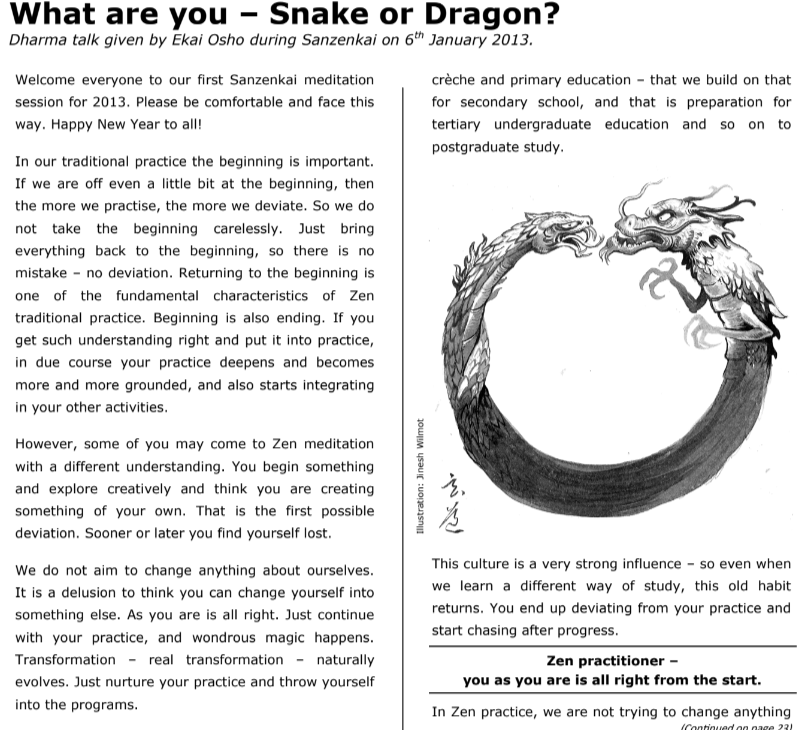Editorial
In this special Winter edition of Myoju, Ekai Osho’s engaging Dharma talk, ‘What are you–Snake or Dragon?’, explores the transformative power of the snake. Indeed, as the Year of the Snake is unfolding and progressing, so is Jikishoan as a practice community.
This 51st Myoju is celebrating this time of transformation, with a wide range of contributions that paint a beautiful picture about what is happening in our community. From an account of the Easter Retreat, to feature articles on ‘Zen–a Slow Process’ and ‘Zen andExcitement’ to various IBS contributions; from membership news about the recent changes in membership structure to an overview of the implementation of our Harassment Policy; from an array of Sangha news to poetry and a special centre-spread of photographs from the 28th April Foundation Day–there is much to explore in this 51st issue of Myoju.
Complementing Ekai-Osho’s Dharma talk is‘ Wind and Rain are smooth in the Year of the Snake’, a Dharma talk given by Tsugen Narasaki Roshi, Abbot of Zuioji and Shogoji, to school children to mark the beginning of this year, and ‘The Serpent’s Teaching’, a poem about change and the transformative power of spiritual development. ‘You are as you are’ was chosen as the theme for this edition. ‘Being as we are’ requires us to be aware, from moment to moment, of our thoughts and feelings as they arise. It is about knowing how to quieten our mind and abandoning our search for something illusionary.
When we keep practising like this, we allow the presence of the moment to be revealed and we find ourselves as we are–in our utter nakedness, in our way of being. This is connecting with our essential self, and as we continue practising being true to ourselves, we realise that we, ourselves, are our own answer to whatever questions we so impatiently wanted to ask.
You are as you are, always, and for all kinds of reasons. The very perception of what you are in each single moment brings with it freedom and a sense of life being completely realised as it is.
Sri Ramana Maharshi so beautifully said that: ‘Life of man is what is. That which is, is. All the trouble arises by having a conception of it. Mind comes in. It has a conception. All trouble follows. If you are as you are, without a mind and its conceptions about various things, all will be well with you. If you seek the source of the mind, then alone all questions will be solved.’ When reading this Myoju, I invite you to take your time exploring the variety of expressions and to enjoy the breath and depth of all the contributions–each single one reveals a picture about being as we are in this moment.
Christine Maingard
On behalf of Ekai Korematsu and the Jikishoan Editorial Committee

